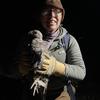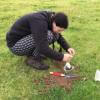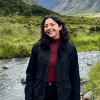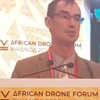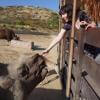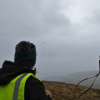With new technologies revolutionizing data collection, wildlife researchers are becoming increasingly able to collect data at much higher volumes than ever before. Now we are facing the challenges of putting this information to use, bringing the science of big data into the conservation arena. With the help of machine learning tools, this area holds immense potential for conservation practices. The applications range from online trafficking alerts to species-specific early warning systems to efficient movement and biodiversity monitoring and beyond.
However, the process of building effective machine learning tools depends upon large amounts of standardized training data, and conservationists currently lack an established system for standardization. How to best develop such a system and incentivize data sharing are questions at the forefront of this work. There are currently multiple AI-based conservation initiatives, including Wildlife Insights and WildBook, that are pioneering applications on this front.
This group is the perfect place to ask all your AI-related questions, no matter your skill level or previous familiarity! You'll find resources, meet other members with similar questions and experts who can answer them, and engage in exciting collaborative opportunities together.
Just getting started with AI in conservation? Check out our introduction tutorial, How Do I Train My First Machine Learning Model? with Daniel Situnayake, and our Virtual Meetup on Big Data. If you're coming from the more technical side of AI/ML, Sara Beery runs an AI for Conservation slack channel that might be of interest. Message her for an invite.
Header Image: Dr Claire Burke / @CBurkeSci

Explore the Basics: AI
Understanding the possibilities for incorporating new technology into your work can feel overwhelming. With so many tools available, so many resources to keep up with, and so many innovative projects happening around the world and in our community, it's easy to lose sight of how and why these new technologies matter, and how they can be practically applied to your projects.
Machine learning has huge potential in conservation tech, and its applications are growing every day! But the tradeoff of that potential is a big learning curve - or so it seems to those starting out with this powerful tool!
To help you explore the potential of AI (and prepare for some of our upcoming AI-themed events!), we've compiled simple, key resources, conversations, and videos to highlight the possibilities:
Three Resources for Beginners:
- Everything I know about Machine Learning and Camera Traps, Dan Morris | Resource library, camera traps, machine learning
- Using Computer Vision to Protect Endangered Species, Kasim Rafiq | Machine learning, data analysis, big cats
- Resource: WildID | WildID
Three Forum Threads for Beginners:
- I made an open-source tool to help you sort camera trap images | Petar Gyurov, Camera Traps
- Batch / Automated Cloud Processing | Chris Nicolas, Acoustic Monitoring
- Looking for help with camera trapping for Jaguars: Software for species ID and database building | Carmina Gutierrez, AI for Conservation
Three Tutorials for Beginners:
- How do I get started using machine learning for my camera traps? | Sara Beery, Tech Tutors
- How do I train my first machine learning model? | Daniel Situnayake, Tech Tutors
- Big Data in Conservation | Dave Thau, Dan Morris, Sarah Davidson, Virtual Meetups
Want to know more about AI, or have your specific machine learning questions answered by experts in the WILDLABS community? Make sure you join the conversation in our AI for Conservation group!
No showcases have been added to this group yet.
- @robin_doolin
- | They/Them
A budding wildlife professional eager to explore the convergence of computer science and wildlife biology.
- 0 Resources
- 1 Discussions
- 4 Groups
- @Mumonkan
- | he / him
Conservation X Labs & Wild Me
Software Engineer for Wildlife Conservation
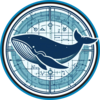
- 0 Resources
- 4 Discussions
- 11 Groups
- @Abigail12
- | She/Her
- 0 Resources
- 0 Discussions
- 1 Groups
- 0 Resources
- 0 Discussions
- 3 Groups
- 0 Resources
- 0 Discussions
- 4 Groups
- 0 Resources
- 0 Discussions
- 8 Groups
- 0 Resources
- 0 Discussions
- 9 Groups
- @BrunaTeixeira
- | She
Master and PhD student in the Postgraduate Program in Animal Biology. She works mainly in Landscape Ecology with an emphasis on bioacoustics and interactions between primates.

- 0 Resources
- 0 Discussions
- 2 Groups
- @hannahrisser
- | She/her
CEH
- 0 Resources
- 0 Discussions
- 10 Groups
- @Mathilde
- | she/her
Natural Solutions
Engineer, I work for a web development company on web application projects for biodiversity conservation. I'm especially interested by camera traps, teledetection and DeepLearning subjects.
- 0 Resources
- 0 Discussions
- 11 Groups
I am an enthusiastic computer scientist, fascinated by animals and I want to collaborate in conservation project ! :D
- 0 Resources
- 1 Discussions
- 3 Groups
Max Planck Institute of Animal Behavior
Behavioral Ecologist
- 1 Resources
- 1 Discussions
- 14 Groups
Article
Ceres Tag sends just in time alerts and GPS location to have the power to track and trace.
22 July 2022
The Earth Species Project (ESP) is a nonprofit organization dedicated to decoding animal communication and translating non-human language.
15 July 2022
This WhaleSeeker article discusses how reliable distribution data depends on accurate labelling from survey images, and how AI can improve this process.
13 July 2022
The Pl@ntNet team is looking for a data scientist with strong skills in python and pytorch development. Pl@ntNet is a citizen observatory of plant biodiversity & research platform at the crossroads of data science,...
7 July 2022
7 July 2022
Rainforest Connection has multiple engineering positions that will suppor their work developing acoustic monitoring devices.
16 June 2022
Evolutionary Ecology group at Naturalis Biodiversity Center (the Netherlands)
11 June 2022
In David Rolnick's group at Mila Quebec AI Institute & McGill University
4 June 2022
IO is hiring for a Software Engineer, Machine Learning Scientist, and Head of Machine Learning & Science
4 June 2022
Careers
Are you passionate about making a meaningful impact on our community? Seattle-based Vulcan is looking to hire a science leader to support its work advising the Paul G. Allen Family Foundation.
4 June 2022
August 2025
event
September 2025
event
event
event
event
October 2025
event
event
event
December 2025
event
March 2026
August 2022
July 2022
event
17 Products
Recently updated products
| Description | Activity | Replies | Groups | Updated |
|---|---|---|---|---|
| Samara P. El-Haddad Wildlife Conservation Junior Specialist at Lebanon Reforestation Initiative (LRI)... |
|
AI for Conservation, Community Base | 5 years ago | |
| How neat, thanks for sharing! We'd love to hear more about your drone project once it's underway, please keep us updated on that one! |
|
AI for Conservation, Emerging Tech | 5 years 1 month ago | |
| Great talk! I thoroughly enjoyed it. Some high schoolers have done small AI projects(s) and have interest in the wildlife. What resources would you all suggest to further... |
|
AI for Conservation, Camera Traps | 5 years 1 month ago | |
| Author: Jody Tucker, U.S. Forest Service, Pacific Southwest Region Carnivore Monitoring ProgramFigures below text in order (Fig 1... |
|
AI for Conservation, Emerging Tech | 5 years 1 month ago | |
| What better way to celebrate Endangered Species Day 2020 than try a new technology to protect them? If you're planning to be out and... |
|
AI for Conservation, Emerging Tech | 5 years 3 months ago | |
| DeepForest docs are here. https://deepforest.readthedocs.io/ Welcome to have a look. My experience is that individual trees cannot be distinguished in satellite... |
|
AI for Conservation | 5 years 4 months ago | |
| Steph, thank you so much for this, this is wonderful :) Really, really apreciate you sharing this with me :) Diving into all of the wonderful resources from you, thank you so very... |
|
AI for Conservation | 5 years 4 months ago | |
| A call put out over on Twitter by Jesse Alston might be of interest here - both for conservationists and grad students. Looks like... |
|
AI for Conservation | 5 years 4 months ago | |
| This can be done, happy to help :) But I think I need to understand the situation a little bit more. Do you already have the data for training / inference? Do you have any... |
|
AI for Conservation | 5 years 4 months ago | |
| Hi there this post on Conservation X labs recently came up on designing softwarre for individual horse recognition: https://... |
|
AI for Conservation | 5 years 5 months ago | |
| Wildlife Insights launched their online platform hosting over 4 million camera trap images. They use AI to automatically classify the... |
|
AI for Conservation | 5 years 8 months ago | |
| Hey everyone! My colleagues and I are hosting a workshop on Animal Re-ID, and the submission deadline is a little less than a month... |
|
AI for Conservation | 5 years 8 months ago |

